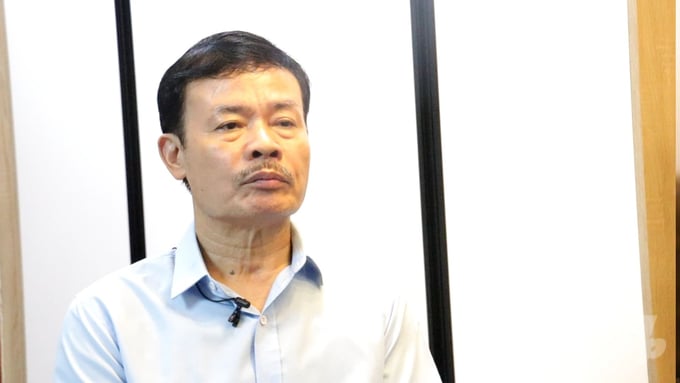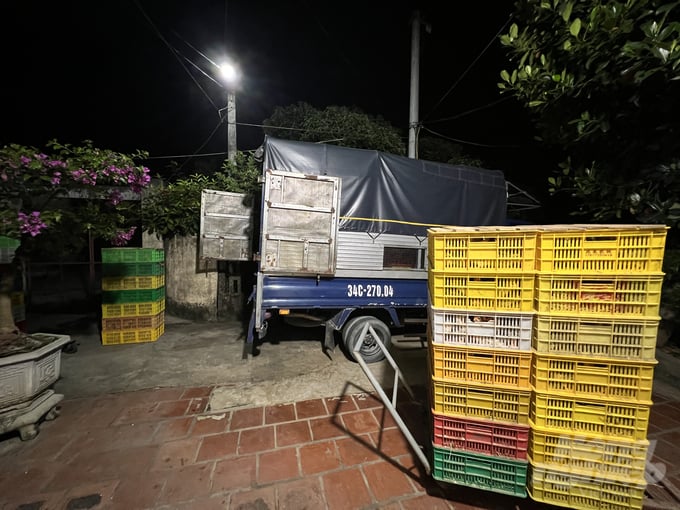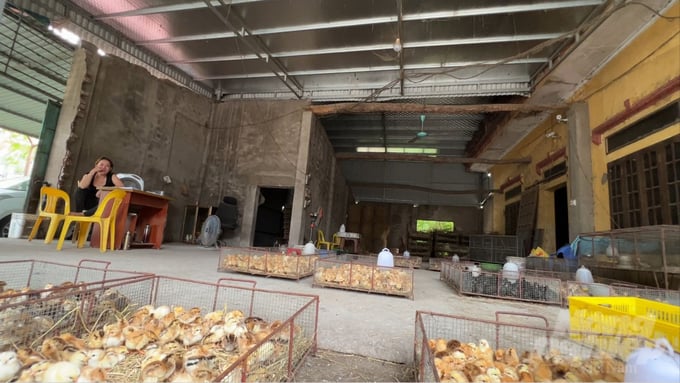June 19, 2025 | 06:42 GMT +7
June 19, 2025 | 06:42 GMT +7
Hotline: 0913.378.918
June 19, 2025 | 06:42 GMT +7
Hotline: 0913.378.918
Mr. Nguyen Xuan Duong, chairman of the Vietnam Livestock Association, believed that only origin, pure breeds (great-grandparental or grandparental breed) should be imported to establish the nuclear breed and refresh domestic breed. Importing commercial breeding stock is forbidden.

Mr. Nguyen Xuan Duong, chairman of the Vietnam Livestock Association. Photo: Hung Khang.
What factors precipitated the present state of the livestock and poultry industry, sir?
It can be said that our livestock production has not yet emerged from the difficulties brought on by falling prices. In particular, poultry businesses, farm proprietors, and family farms have endured unending losses over the past two years.
There are three primary factors contributing to this situation. First, we have not yet mastered disease control, resulting in enormous expenditures for disease prevention and treatment. For instance, in the past, normal livestock production conditions necessitated only 3-5% of total production costs to be spent on veterinarian medications, compared to the current rate of 15-20%.
Second, the output market for livestock products has struggled due to diminished purchasing power, which has resulted in decreased prices. Particularly, domestic pork and poultry flesh have faced stiff competition from imported products. We must embrace the objective difficulties as Vietnam enters into free trade agreements.
Thirdly, cattle and poultry contraband have severely impacted the market. Illegal cattle trafficking occurs throughout the Northern and Southwestern provinces. If it can not be controlled, it should be very hazardous, due to the high risk of disease transmission. If we do not intervene, domestic livestock production will inevitably face accumulating difficulties.
How do you evaluate the frequency and degree of severity of cattle and poultry contraband over the past year?
I believe this is a significant issue. Perhaps the number of contraband cattle and poultry is not comparable to that of domestic livestock, but it has a significant impact on the sustainable growth of our animal husbandry.
The Party and State affirm that livestock production is an economically significant sector of agricultural production. In fact, numerous domestic and foreign direct investment companies have made substantial investments in livestock infrastructure, particularly breeding stock production.
If breeding stock importation continues, as reported by Vietnam Agriculture News, we will be unable to control breeding stock quality, disease and epidemics, and the market.

Thousands of Chinese chickens without vaccines or quarantine papers are about to be transported to the Dai Xuyen poultry wholesale market, Phu Xuyen district, Hanoi. Photo: Hung Khang.
For a country's livestock production, except in cases of "cannot help doing" like that of 2020, when the domestic pig market is too short, MARD was compelled to submit a request to the government for permission to import live pigs for slaughter. During normal conditions, allowing foreign livestock and poultry breeds to flood into the country is a no-no, especially since they are clandestine breeds with no agency to check or supervise them.
In the past, illegal substances were used to enhance cows that were trafficked into Vietnam from other countries, causing consumers to shun domestic livestock products. We must remember this instruction. We believe allowing a limited number of live animals into the country is a minor issue, but it's actually not.
Regarding poultry, there is no paucity of breeds in the country, including free-range poultry varieties, and the domestic supply is abundant and of high quality. Paradoxically, however, unvaccinated, inexpensive, and uncontrolled poultry breeds continue to be imported into our country in large numbers.
In what circumstances, then, should we import foreign breeds?
It must be acknowledged that breeds significantly affect the productivity of livestock husbandry and agricultural techniques. Therefore, domesticated species must be self-sufficient. We only import a limited number of original breeds and pure lines (grandparents' breeds) to construct nuclear herds, which are used for cross-breeding and selective breeding, or to provide fresh blood for domestic breeding herds. It is a major no-no to import commercial breeds because our country has the capability to produce breeds.
Sir, according to the provisions of the Law on Animal Husbandry and current legal documents, there are sanctions in place for the purchase and sale of livestock and poultry breeds of indeterminate origin and breeds trafficked from foreign countries. Approximately three to four months before the Lunar New Year, significant numbers of smuggled poultry strains appear. Are we unable to maintain control?
There is no such thing as uncontrollable, so we should not use that term. We all have legal institutions and very severe punishments, but to what extent do the authorities enforce them.

Smuggled poultry breeds are sold openly at the Dai Xuyen poultry breed market, Phu Xuyen district, Hanoi. Photo: Hung Khang.
As challenging as narcotics are, we must continue to work, but preventing animal importation is not nearly as challenging. Considering that poultry, ducks, and hogs are living creatures. It is able to cry and cannot be concealed in a plastic bag or sack; therefore, it must be conveyed in large quantities by means other than plastic bags or sacks, along with oxygen to keep the animal breathing. Consequently, it cannot be said that the authorities were unaware or unable to detect it.
Breeding chickens, ducks, and hogs that transit through a community must be reported. Therefore, not only the Ministry of Agriculture and Rural Development but also other relevant ministries and subdivisions, particularly local governments, must intervene vigorously to prevent this situation entirely.
We must also promulgate extensively in order for law enforcement and market management agencies to accompany us. I believe we will be able to prevent reproductive contraband if we can accomplish this, but it will not be impossible.
Thank you!
Translated by Linh Linh

(VAN) After 5 years of implementation, the CAI initiative has helped coffee growers change their farming practices, moving toward responsible agriculture that meets global export standards.

(VAN) The primary prerequisite for the comprehensive and robust integration of Vietnam's livestock sector into the global value chain is the establishment of a disease control system.

(VAN) The results of national programs are essential for establishing a contemporary livestock sector that is well-equipped to meet the demands of both domestic and international markets, with robust biosafety standards.

(VAN) The UNESCO Global Geopark revalidation of Non nuoc Cao Bang and the transition to a two-tier administrative model are presently undergoing a pivotal moment in Cao Bang, the northernmost province of Vietnam.
/2025/06/13/5330-2-004539_953.jpg)
(VAN) Changing policy mindset and removing investment barriers are urgent requirements to open up new development space for enterprises in the agricultural sector.

(VAN) The areas include the restoration of five million hectares of marine ecosystems.

(VAN) Dr. Le Van Nguyen, Director of the Institute of E-Commerce Management (ECM), emphasizes the potential for green development through the cultivation of fruit trees, particularly in provinces such as Son La.